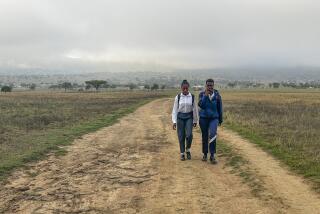Get Education to Lead Nation, Mandela Tells Pupils
- Share via
SOWETO, South Africa — Nelson R. Mandela shed his suit jacket Tuesday in the small, shaded back yard he hadn’t seen in more than 27 years, leaned back in a lawn chair and sipped a glass of orange juice to recover from the grueling schedule of his first two days of freedom.
As he chatted quietly with his wife, the gentle evening breeze carried a message from the hundreds of youngsters who had gathered outside his garden wall: “Viva, Nelson Mandela, viva!”
The 71-year-old leader of the African National Congress (ANC) rose from his chair, put on his coat and went out the gate to issue a heartfelt plea to some of the Soweto children, born long after he went to prison in 1962, who have made the pilgrimage to his hilltop home since his release Sunday.
“Tomorrow is school,” he said. “We--your parents, your brothers, your sisters--love you, and we want you to lead this country. But you cannot carry out that responsibility if you have not got the weapons, the weapons of education.”
Mandela, the guiding light of South Africa’s liberation movement, left a rally in his honor by helicopter and later was ferried by car to the modest brick home that he left behind in the Orlando West section of Soweto.
What he saw there Tuesday was a house surrounded by hundreds of supporters and journalists, a dozen vans with television satellite dishes mounted on top and a microphone set up for him near the street. The ANC’s flag was flying above the doorway and the one-car garage door was painted in the organization’s black, green and gold colors. Also written on the garage door was the Zulu slogan: “Amandla--Awethu”-- Power is ours.
Mandela’s arrival marked the end of a journey begun when President Frederik W. de Klerk released him from a prison near Cape Town, 800 miles away, where he was serving a life prison term for sabotage.
“People have come from all over since Saturday just to see the guy,” said Mathews Ntumba, 25, a Mandela neighbor. “And they don’t even sleep.”
When he saw Mandela arrive, 27-year-old Samuel Mashinini waved from the crowd. “I don’t know what to do,” he said, shaking his head in disbelief. “Must I laugh or must I cry?”
Mandela, a tall, dapper man with graying hair, spoke briefly to the well-wishers, telling them he and other ANC leaders “will always sleep with smiling faces” because of the support and inspiration shown their supporters. Then he asked them to “disperse in peace,” and he entered his four-room house.
About two hours later, though, a crowd of youngsters gathered outside the house and Mandela emerged again with his wife, Winnie, at his side to thank the children for their greetings and urge them to devote themselves to their schoolwork “in spite of the difficult circumstances under which you have to study.”
“That is the best way of welcoming me back,” he said. “Some people think the ANC has been saying to our children: freedom before education. But that’s not true. We have always said our children should go back to school.
“You must study,” he added. “You must be with your books all the time. You can fight politics, but make sure you don’t neglect your studies.”
The youngsters cheered Mandela’s words, and after he went back inside his house they talked excitedly about the great leader whom they had learned about from their parents.
“He looks great,” said Tsholofelo Sebobe, 15. “I expected him to look older. He’s tall, handsome and stands very straight. He’s very dignified.”
“Most of the people in Soweto are not interested in school,” said her 17-year-old sister, Karabo. “But if they hear it from him, I think they’ll listen. If your mother talks to you, you tend to ignore her.
“He’s just a great man and when he says something he puts reason behind it. He didn’t just say go to school, he tells you why to go to school. In that sense, he’s a great leader. He talks sense.”
More to Read
Sign up for Essential California
The most important California stories and recommendations in your inbox every morning.
You may occasionally receive promotional content from the Los Angeles Times.














